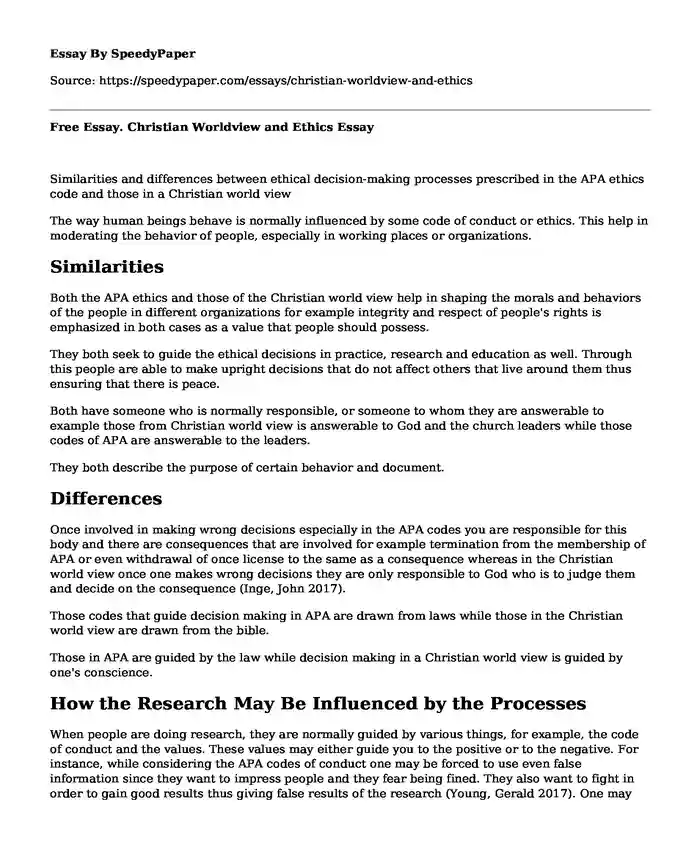
| Type of paper: | Course work |
| Categories: | Human resources Christianity Ethical dilemma Organizational culture |
| Pages: | 2 |
| Wordcount: | 546 words |
Similarities and differences between ethical decision-making processes prescribed in the APA ethics code and those in a Christian world view
The way human beings behave is normally influenced by some code of conduct or ethics. This help in moderating the behavior of people, especially in working places or organizations.
Similarities
Both the APA ethics and those of the Christian world view help in shaping the morals and behaviors of the people in different organizations for example integrity and respect of people's rights is emphasized in both cases as a value that people should possess.
They both seek to guide the ethical decisions in practice, research and education as well. Through this people are able to make upright decisions that do not affect others that live around them thus ensuring that there is peace.
Both have someone who is normally responsible, or someone to whom they are answerable to example those from Christian world view is answerable to God and the church leaders while those codes of APA are answerable to the leaders.
They both describe the purpose of certain behavior and document.
Differences
Once involved in making wrong decisions especially in the APA codes you are responsible for this body and there are consequences that are involved for example termination from the membership of APA or even withdrawal of once license to the same as a consequence whereas in the Christian world view once one makes wrong decisions they are only responsible to God who is to judge them and decide on the consequence (Inge, John 2017).
Those codes that guide decision making in APA are drawn from laws while those in the Christian world view are drawn from the bible.
Those in APA are guided by the law while decision making in a Christian world view is guided by one's conscience.
How the Research May Be Influenced by the Processes
When people are doing research, they are normally guided by various things, for example, the code of conduct and the values. These values may either guide you to the positive or to the negative. For instance, while considering the APA codes of conduct one may be forced to use even false information since they want to impress people and they fear being fined. They also want to fight in order to gain good results thus giving false results of the research (Young, Gerald 2017). One may also be tempted to make decisions that favor them and their process in order to get results of their choice and thus compromising on the results of the research.The research based on the Christian world view conduct process mostly gives good results as the people are normally guided by their inner being as they know they are answerable to God who sees them even in secrets thus their research is likely to be sincere. This category is normally guided by what is within them, and they work towards pleasing God and not man.
Conclusion
It's good to note that every organization should have its own set of codes which may be either their own or drawn from the Christian worldview as they help people in the process of decision-making.
References
Inge, John ( 2017). A Christian theology of place. Routledge.
Young, Gerald ( 2017). Revising the APA ethics code. Cham, Switzerland: Springer International Publishing.
Cite this page
Free Essay. Christian Worldview and Ethics. (2023, Jan 05). Retrieved from https://speedypaper.net/essays/christian-worldview-and-ethics
Request Removal
If you are the original author of this essay and no longer wish to have it published on the SpeedyPaper website, please click below to request its removal:
- Free Essay on Intervention Study
- Free Essay on Internet Privacy Resolution
- Free Essay on Union in Peril: The Crisis over British Intervention in the Civil War by Howard Jones
- Essay Sample on Ecological Destruction in the Metaphysical or Religious Assumptions About Reality
- Essay Sample on Characteristics of a Professional or Competent Health Worker
- Essay Sample on Off-Off-White
- Essay Sample on Sports in Ancient Greece
Popular categories




